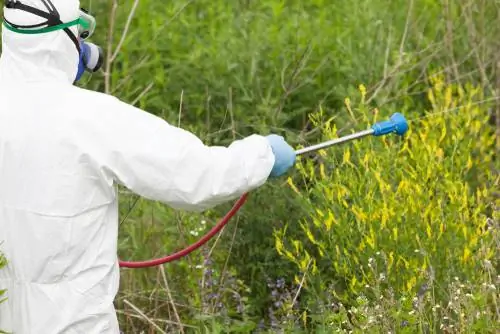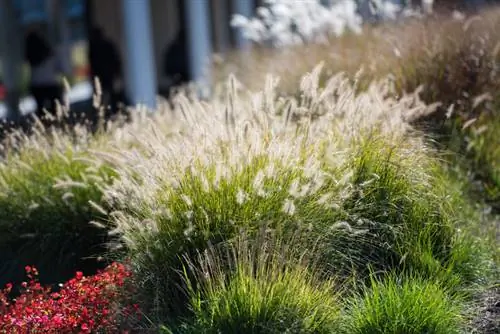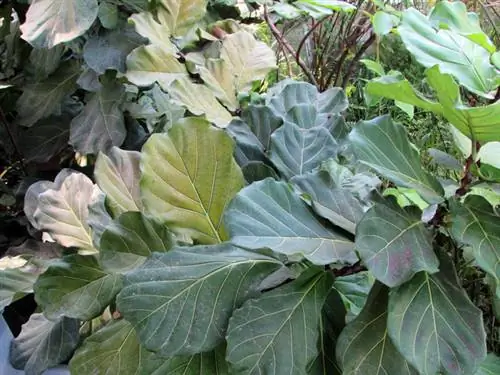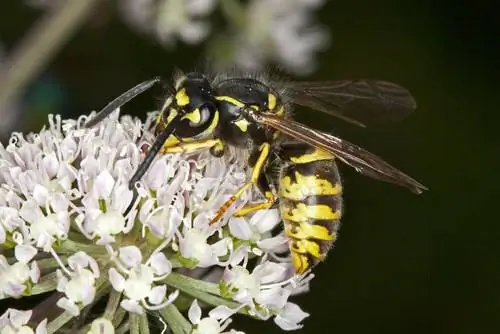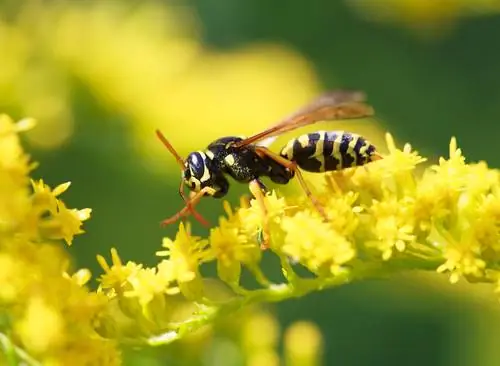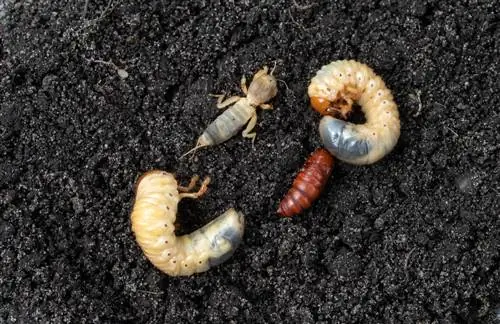- Author admin leonars@hobbygardeners.com.
- Public 2023-12-26 14:17.
- Last modified 2025-06-01 06:02.
When spring arrives in the garden, unfortunately it's not just vegetable and ornamental plants that put their first tender tips out of the ground. Seed and root weeds, grasses and mosses also make life difficult for the gardener. The following article reveals which herbicides are allowed in the garden and whether their use makes sense at all.
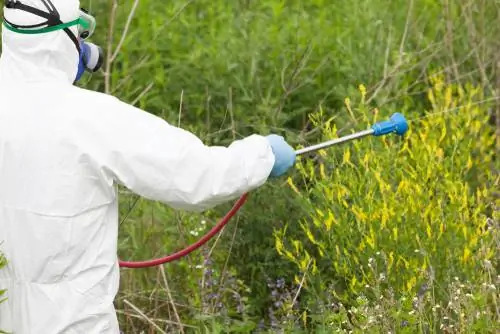
What are herbicides?
Herbicides are also known as pesticides or weed killers. These are biologically or chemically active substances that primarily kill certain types of plants, such as monocotyledonous or dicotyledonous weeds or mosses, by their active ingredients penetrating through the leaves or roots and thus destroying the unwanted plants.
So-called “weeds” certainly have their place from an ecological point of view, as they provide welcome food for numerous insects. However, our cultivated plants are in a constant competition with them for light, water and nutrients - which the much more robust weeds would usually win. The result would be that the vegetable harvest would not be satisfactory or that the perennial bed would be overgrown by wild plants. Accordingly, the gardener combats weeds in various ways:
- by weeding, plucking, digging and hoeing
- through mechanical methods such as laying out a weed protection mat
- by applying weed killers, both chemical and biological
Since when have herbicides been around?
Weed killers in the ultimate sense only appeared in the middle of the 19th century, when gardeners first used iron sulfate and sulfur sulfate to combat the annoying weeds. Iron sulfate is still used today primarily against moss. The compound 2, 4-D, which is also present in many lawn herbicides today, has only been fighting dicotyledonous weeds since the 1940s. A chemically close relative of this herbicide is the infamous “Agent Orange”, which destroyed entire rainforests during the Vietnam War and even causes considerable damage to people living there today.
Are herbicides allowed in the garden?
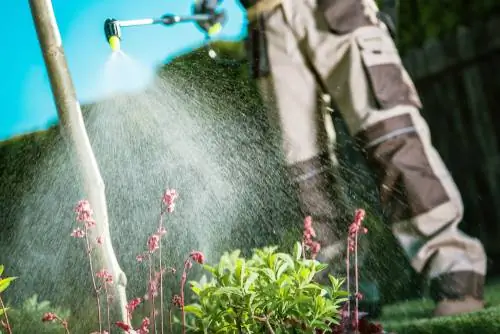
You can't just spray herbicides in the garden at will
According to the Plant Protection Act in force in Germany, the use of herbicides and other plant protection products is generally permitted on areas used for agriculture, forestry and gardening. However, not everyone is allowed to use every plant protection product as they please, because it must be specifically approved for use in home and allotment gardens.
In order for a plant protection product to be used in the private sector - i.e. in home and allotment gardens - the manufacturers must first submit an application for approval to the Federal Office of Consumer Protection and Food Safety. The authority ultimately decides on such approval, but only grants it to a limited extent. On commercially used agricultural and forestry land, however, completely different means may be used, but in private gardens - for good reason! - are not allowed.
No pesticides on paved areas
However, the application permit only applies to areas used for gardening, i.e. H. Paved garden areas such as garage driveways, terraces and paths must not be treated with weed killers - no matter how annoying the weeds that keep growing between the joints are. All you have to do here is to combat the weeds mechanically (e.g. by scraping joints), thermally by burning them or sealing the joints with suitable materials. However, the latter in turn prevents rainwater from seeping in and is therefore not a good ecological alternative.
These herbicides are approved for home and allotment gardens
The herbicides listed in the following table have been approved by the responsible Federal Office for Consumer Protection and Food Safety until the end of 2020 at the most, although an extension of the approval can be granted at the manufacturer's request.
| Medium | Active ingredient | Application | Area of application | Application form | Notes |
|---|---|---|---|---|---|
| Allflor lawn fertilizer with weed killer | 2, 4-D + Dicamba | against lawn weeds | on lawns | Granules for spreading | max. Use twice a year |
| Allflor lawn fertilizer plus moss killer | Iron II sulfate | against moss in lawns | on lawns | Granules for spreading | max. Use twice a year, hazardous to he alth, protective clothing |
| Bayer long-term weed-free Permaclean | Glyphosate + Metosulam + Flufenacet | against grasses, seed and root weeds | in house and allotment gardens | portioned granules for dissolving in water and spraying | effective for 6 months, hazardous to he alth, protective clothing |
| Bayer Garden Weed Free Keeper | Glyphosate | against grasses, seed and root weeds | in house and allotment gardens, v. a. before sowing new lawns and for ornamental trees | Concentrate | Application on paved areas requires approval, protective clothing required |
| Beckhorn weed killer plus lawn fertilizer | 2, 4-D + Dicamba | against dicotyledonous weeds | on lawns | Granules | max. Use twice a year |
| Beckmann in the garden weed killer plus lawn fertilizer | 2, 4-D + Dicamba | against dicotyledonous weeds | on lawns | Granules | max. Use twice a year |
| BELOUKHA GARDEN | Pelargonic acid | against annual monocotyledonous and dicotyledonous weeds, against mosses | Paths and places with woody plants | Sprays | Use on paved surfaces requires approval |
| Compo organic lawn moss free | Pelargonic acid | against annual monocotyledonous and dicotyledonous weeds, against mosses | on lawns, in the garden | Sprays | Use on paved surfaces requires approval |
| Celaflor Acetic Acid | Acetic acid | against annual monocotyledonous and dicotyledonous weeds, against mosses | on lawns, ornamental trees. Pome and stone fruit, paths and places with trees | Sprays | Use on paved surfaces requires approval |
| Celaflor Lawn Weed Free Anicon Ultra | MCPA + clopyralid + fluroxypyr | against common lawn weeds | on lawns | Concentrate | Protective clothing required |
| Celaflor Lawn Weed Free Weedex | 2, 4-D + MCPA + Dicamba + Mecoprop-P | , against common lawn weeds, leaf and root effect | on lawns | Concentrate | Protective clothing required |
| Chrysal Moss-Los Happy | Iron II sulfate | against moss in lawns | on lawns | Granules for spreading | max. Use twice a year, hazardous to he alth, protective clothing |
| Chrysal weeds away | 2, 4-D + Dicamba | against dicotyledonous weeds | on lawns | Granules | max. Use twice a year |
Tip
On the website of the Federal Office of Consumer Protection and Food Safety you will find an online database under the “Plant protection products” tab and then under “House and allotment garden” in which all herbicides currently permitted for non-professional users are listed.
Excursus
Glyphosate is heavily criticized
Glyphosate, a chemical compound of phosphonate, is one of the total or broad-spectrum herbicides and is considered very effective. The drug was brought onto the market under the brand name “Roundup” in the mid-1970s and is now immensely controversial. Since glyphosate is increasingly being used in conventional agriculture, traces of it have been detected in groundwater, in our food and even in the human body. After the initial euphoria, glyphosate is now considered carcinogenic and appears to have a significant impact on ecosystems - including any damage to the genetic material. Therefore, this herbicide should be used with great caution and should not be used in the home garden if possible.
This article from BR television offers an insight into the history of glyphosate:

When does the use of herbicides make sense and when not?
Don't trust a garden where weeds don't grow.
No question: When unwanted herbs sprout in the perennial garden and vegetable patch, quick help is necessary. Annual seed weeds can be easily controlled by regularly plucking them out before sowing. But what about root weeds? In particular, thyme, morning glories, couch grass and the like keep coming back despite constant weeding. The use of herbicide seems inevitable. But does its use actually make sense?
What arguments speak against the use of herbicides
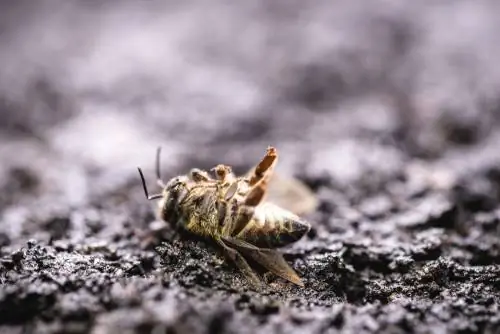
Herbicides usually harm not only unwanted weeds but often even bees and other insects
- AgainstRoot weeds So-called leaf herbicides are used, the active ingredients of which are absorbed through the leaves and then transported further into the roots. However, for these to be effective, there must be a sufficiently large leaf mass.
- Herbicidesnot only damage weeds, but also the plants desired in the garden bed - in many cases even months after application. It is almost impossible to avoid the product used being blown away.
- Herbicides in lawns also only work against monocotyledonous and dicotyledonous weeds. However, undesirable grasses such as millet are difficult to control because there is no selective herbicide for them.
In which cases the use of herbicides can make sense
If a garden or a single bed is to be replanted that is heavily overgrown with root weeds such as thistle, couch grass or nettle, the use of herbicides actually makes sense in individual cases. Proceed as follows:
- Apply the herbicide before digging.
- Dig up the soil and remove all plant debris.
- Sow a green manure after the required waiting period.
- Alternatively, you can also grow potatoes first.
- Clean up the field after one year.
- Apply herbicide again.
- Observe the prescribed waiting time before replanting.
- Replant the bed/garden.
If you use perennials and other plants from weed-infested locations when replanting, first carefully remove the old soil and wash it from the rootstock. These often contain germinable weed seeds or root remains.
How do herbicides work?
Most herbicides approved for home gardens act as contact poisons above or on the leaves, which is why these products are usually applied as sprays and the plants are sprayed with them.
- Leaf corrosives: only apply in dry weather, also effective at temperatures below ten degrees Celsius; Disadvantages: Since the active ingredients do not go into the roots, root weeds keep coming back after treatment
- Systemic herbicides: are also absorbed through the leaves, but do not remain localized; Instead, they also migrate into unwetted parts of the plant and into the roots; only use in warm temperatures
- Soil herbicides: often contained in lawn herbicides, primarily combat the weed seeds that are dormant in the soil
Systemic herbicides are also known as total herbicides. Only use this if crops and ornamental plants are not affected - weed killers do not differentiate between “good” and “bad”. Therefore, only spray when there is no wind and protect the crops, for example with a cover. Only a few herbicides work selectively and only kill certain groups of plants. 2, 4-D, which is often used in lawn herbicides, only controls dicotyledonous plants and leaves monocotyledonous plants - which also include grasses - standing.
Use herbicides correctly
Herbicides are usually available commercially as sprays or watering agents. Weed killers for use on lawns are only available in the form of solid granules. When using these products, be sure to observe the following safety instructions:
- Always follow the manufacturer’s dosage instructions!
- Apply herbicides only on dry days, otherwise they will be washed off again
- Spray only on days with absolutely no wind, otherwise the products can reach other areas of the garden
- Never dispose of leftovers via the sewage system as they cannot be broken down
- First let weeds grow and then fight them: Sufficient leaf mass is necessary for high effectiveness.
- Against root weeds, spray again after waiting about two weeks, as they often sprout again.
- Children and pets must not be near when spraying herbicides!
- You yourself wear long-sleeved protective clothing and sturdy shoes.
Herbicides cause many problems
It is best, however, if herbicides - even seemingly harmless ones such as acetic acid and s alt - would not even be used in the home garden. These agents are always highly toxic and have serious effects on the ecosystem - animals as well as other plants are also affected and often suffer damage. Even if the label says “bee-friendly” on the products, they are not - especially since other beneficial insects such as birds, hedgehogs, etc.be poisoned by them. Quite apart from that, the active ingredients often end up in the groundwater and thus also in our drinking water due to improper use. It is not without reason that glyphosate can also be detected in our food and accumulates in our bodies.
Frequently asked questions
What do I need to buy if I want to fight pests or fungi?
With herbicides you only fight unwanted plants. However, if you want to get rid of pests, you can use insecticides or pesticides. Depending on the type, there are suitable fungicides to combat fungi. These products are all summarized under the general term “plant protection products”.
Are there also home remedies that can be used as herbicides?
In fact, there are cheap remedies in every household that can be used to combat weeds just as effectively. vinegar orVinegar concentrate and s alt are worth mentioning, but also citric acid. The following applies to all products: they should be used with caution and only on areas used for gardening. Home remedies also fall under the Plant Protection Act! A good biological method for removing weeds, however, is home-made nettle manure.
Can I use normal household vinegar to remove the green stuff from between the paving slabs?
Even with supposedly environmentally friendly home remedies such as vinegar concentrate, citric acid or pelargonic acid, you are not allowed to clear paved garden areas of weeds. Strictly speaking, these products are also herbicides and can end up in groundwater. The same goes for s alt.
Tip
If you don't want to constantly bend over to pluck and weed, simply use garden tools with a long handle. Alternatively, you can also burn weeds or pour boiling water over them in a completely non-toxic way. But be careful: both of these only work if there are no cultivated plants nearby.

